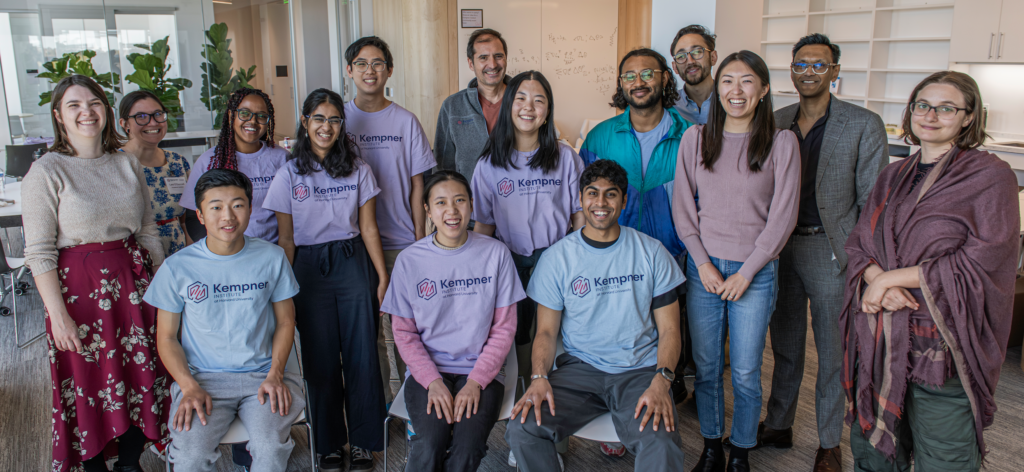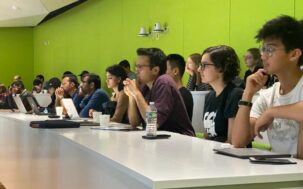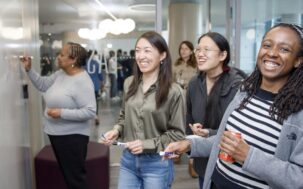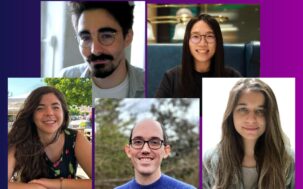KURE Undergraduates Celebrate Completion of Spring Research Projects

Spring 2024 KURE program participants Antara Bhattacharya, Ellie Yin, and Yeabsira Mohammed (left to right), celebrate the completion of their projects at the KURE luncheon on April 25, 2024.
Cambridge, MA—The first cohort of participants in the Kempner Undergraduate Research Experience (KURE) gathered on April 25 to celebrate the successful completion of the Spring 2024 program.
The program provided funding for 11 Harvard undergraduates, each supervised by a Kempner-affiliated faculty member, to undertake term-time research projects investigating the foundations of intelligence in natural and artificial systems.

Participants entered the program with varying degrees of experience in machine learning and computational neuroscience research, and through the program were able to utilize Kempner faculty mentors and Kempner compute resources to explore a range of topics, from using AI in predicting antibiotic resistance to understanding how language models understand (or misinterpret) humor.
“I am incredibly grateful to have had the opportunity to work with such accomplished, kind, knowledgeable faculty who were patient and welcoming to a student who had never done research before,” said Ellie Yin, a sophomore at Harvard College, whose project studied enhancing deep neural network perception for human-like shape recognition. “This experience has piqued my interest in research, and I hope to continue exploring it further and honing in on what topics I am interested in pursuing in the future.”
The KURE program offers research opportunities for undergraduates during both the fall and spring semesters. The Kempner also offers a full-time summer research program in intelligence for undergraduates. To learn more, visit the undergraduate research programs page on our website.
The full list of Spring 2024 KURE participants, mentors and projects are listed below:
| Student name | Supervisor/Mentor | Project title |
| Antara Raaghavi Bhattacharya ’25 | Faculty Supervisor: Tomer Ullman, Primary Mentor: Jennifer Hu | When AI outputs go wrong: Using humor as a lens into pattern learning in language models |
| Corwin Cheung ’26 | Faculty Supervisor: Bernardo Sabatini, Primary Mentor: Celia Beron | Neurobiological data inspired metric to analyze mechanisms of learning in Artificial Neural Networks |
| Ben Choi ’26 | Faculty Supervisor: Demba Ba | Using AI to Decode the Secrets of the Human Brain: Neural Processing and Interpretation via Autoencoder-Targeted Adversarial Transformers (AT-AT) |
| Amy Feng ’26 | Faculty Supervisor: Melanie Weber | Graph Pooling via Discrete Curvature |
| Brian Ham ’25 | Faculty Supervisor: Sham Kakade, Primary Mentor: David Brandfonbrener | Convolutions for Improved Transformer Length Extrapolation and N-Gram Modeling |
| Helen He ’26 | Faculty Supervisor: David Alvarez-Melis, Primary Mentor: Naomi Saphra | Performance of Large Language Models on Low-resource, High-similarity Languages |
| Lavik Jain ’27 | Faculty Supervisor: Marinka Zitnik, Primary Mentor: Yasha Ektefaie | Predicting Antibiotic Resistance in Mycobacterium Tuberculosis with Interpretable Machine Learning |
| Sean Meng ’26 | Faculty Supervisor: Bernardo Sabatini, Primary Mentor: Kevin Mastro | Informing ML ‘Exploration/Exploitation’ Balance Through Decision-Making Algorithm Maturation in Mice |
| Yeabsira Mohammed ’25 | Faculty Supervisor: George Alvarez | Sensitivity of Deep Neural Networks to Image Scrambling |
| Aneesh Muppidi ’25 | Faculty Supervisor: Samuel Gershman, Primary Mentor: Wilka Carvalho | Unsupervised Agent Discovery Using Object-Centric Inverse Reinforcement Learning |
| Ellie Yin ’26 | Faculty Supervisor: George Alvarez | Enhancing Deep Neural Network Perception for Human-like Shape Recognition |
About the Kempner
The Kempner Institute seeks to understand the basis of intelligence in natural and artificial systems by recruiting and training future generations of researchers to study intelligence from biological, cognitive, engineering, and computational perspectives. Its bold premise is that the fields of natural and artificial intelligence are intimately interconnected; the next generation of artificial intelligence (AI) will require the same principles that our brains use for fast, flexible natural reasoning, and understanding how our brains compute and reason can be elucidated by theories developed for AI. Join the Kempner mailing list to learn more, and to receive updates and news.
PRESS CONTACT:
Deborah Apsel Lang | (617) 495-7993 | kempnercommunications@harvard.edu






